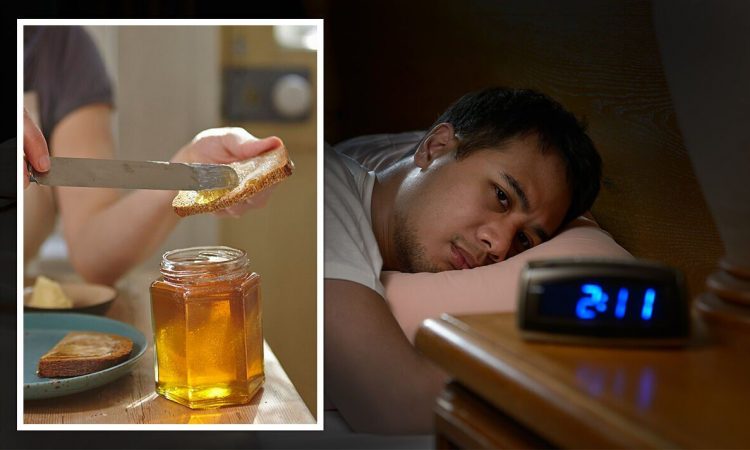Lorraine: Daisy Maskell discusses living with insomnia
We use your sign-up to provide content in ways you’ve consented to and to improve our understanding of you. This may include adverts from us and 3rd parties based on our understanding. You can unsubscribe at any time. More info
According to a study conducted last year by Formulate Health, 36 percent of UK adults said they struggle to get to sleep at least on a weekly basis, while almost one in five had trouble falling asleep every single night. Acute insomnia can last from just one night to a few weeks, while chronic sufferers can’t sleep three nights a week for at least three months. Although there are lots of ways to try to improve your sleep pattern, including both physical and mental routines, there is also evidence that certain foods can improve or disturb sleep.
Cheryl Lythgoe, matron at private healthcare provider Benenden Health, recommended a popular sweet food that could aid sleep.
She explained: “Raw honey stimulates melatonin and shuts off orexin in the body, the chemical that makes us feel sharp and alert.
“A mug of hot water, lemon and honey is a great evening drink for soothing the body and relaxation before bed.”
She also endorsed other snacks and drinks that could help.

“Cherries are well known for being one of the best foods for sleep as they naturally contain melatonin, the chemical that controls the body’s internal clock to regulate sleep,” she said.
“Research suggests that eating cherries or drinking cherry juice an hour before bedtime results in a better night’s rest.”
She added: “Bananas contain magnesium and potassium which are natural muscle relaxants and also contain carbohydrates, all of which help promote sleep.
“As well as being a great source of protein, turkey is great for encouraging sleepiness. It is high in tryptophan, an amino acid that calms the body and balances your hormones, which helps to induce sleep.
DON’T MISS
“Almonds contain a high amount of magnesium that helps to relax the body.
“Magnesium is also great for regulating our blood sugar as we sleep which means the body naturally switches from its adrenaline cycle to what is known as the ‘rest and digest’ cycle.”
In the same way that these foods can aid sleep, others – including chocolate, cheese and curry – can have the opposite effect, Cheryl warned.
She stated: “Chocolate has a high caffeine content, which during the latter stages of sleep can cause rapid eye movement to occur more frequently – leading to the grogginess you may feel in the morning.

“Aged cheese contains a high level of the amino acid, tyramine. This causes our bodies to release the “fight or flight” hormone which increases alertness for a number of hours.
“Spicy foods like curries, hot sauces and mustard contain high levels of capsaicin which causes your body to elevate its normal temperature, interfering with the thermoregulation process which disrupts sleep.”
She also recommended against eating foods with high sugar content like ice-cream and sweets before bed as the crash in sugar levels “makes your body believe there is an emergency and wakes you up from slumber”.
And other unhealthy snacks like crisps were a no go, she said.

“Crisps and salted nuts dehydrate the body and increase water retention causing tiredness and fatigue,” she said.
“Experts recommend staying away from salty foods two to three hours before bed to increase the chance of a good night’s sleep.”
Cheryl also believed avoiding physical activity in the two hours leading up to bed time promotes a better night’s sleep.
And for those who suffer with stress-related insomnia she advised writing a to do list for the next day before bed, to clear the mind of any stress or anxiety.
Source: Read Full Article
